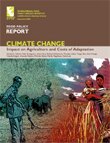Competition over resources
In the environmentally constrained but more populous world that can be expected over the course of this century, there will be greater scarcity of three key resources: food, water and energy. Demand for all three resources is already beyond that which can be sustained at current levels. Once population growth and the effects of climate change are factored in, it is clear that greater competition for such resources should be expected, both within and between countries, potentially leading in extreme cases to conflict.
 The Climate Change and The Military (CCTM) Project, based on the co-operation of a group of leading think tanks, "will orchestrate a strong message from the security sector to the December 2009 climate change negotiations taking place at COP 15 in Copenhagen" according to Tom Spencer, the CCTM Project Coordinator (pictured left).
The Climate Change and The Military (CCTM) Project, based on the co-operation of a group of leading think tanks, "will orchestrate a strong message from the security sector to the December 2009 climate change negotiations taking place at COP 15 in Copenhagen" according to Tom Spencer, the CCTM Project Coordinator (pictured left). This Food Policy Report presents research results that quantify climate-change impacts, assess the consequences for food security and estimate the investments that would offset the negative consequences for human well-being.
This Food Policy Report presents research results that quantify climate-change impacts, assess the consequences for food security and estimate the investments that would offset the negative consequences for human well-being. 